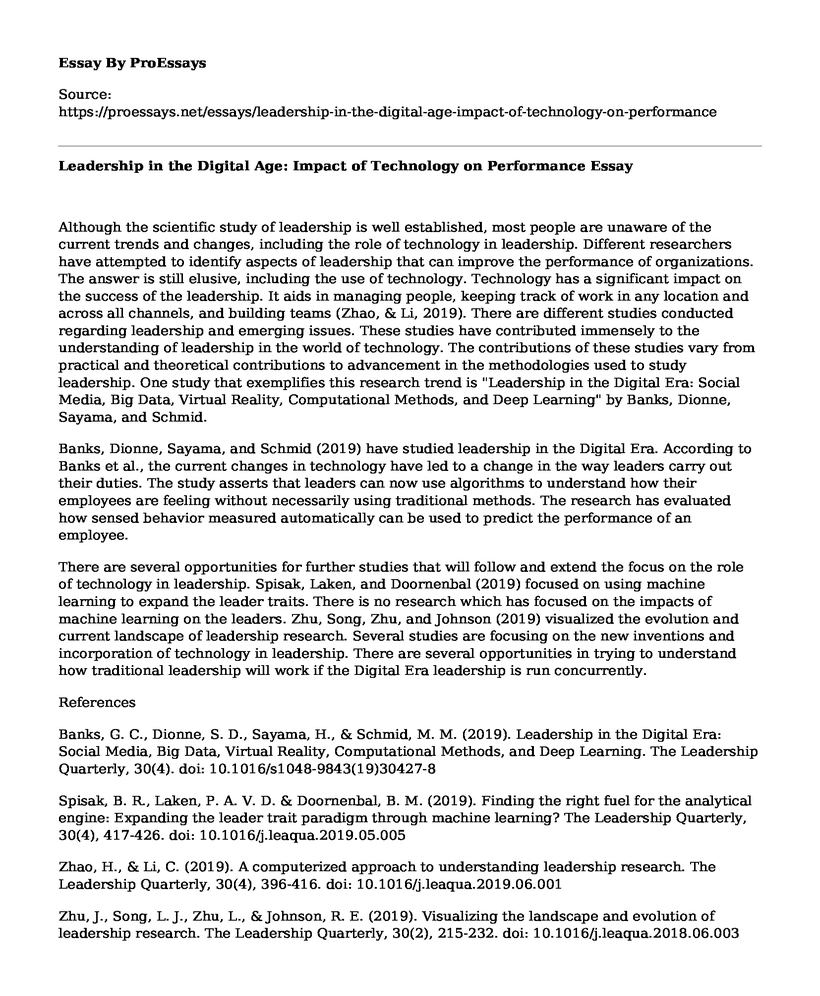Although the scientific study of leadership is well established, most people are unaware of the current trends and changes, including the role of technology in leadership. Different researchers have attempted to identify aspects of leadership that can improve the performance of organizations. The answer is still elusive, including the use of technology. Technology has a significant impact on the success of the leadership. It aids in managing people, keeping track of work in any location and across all channels, and building teams (Zhao, & Li, 2019). There are different studies conducted regarding leadership and emerging issues. These studies have contributed immensely to the understanding of leadership in the world of technology. The contributions of these studies vary from practical and theoretical contributions to advancement in the methodologies used to study leadership. One study that exemplifies this research trend is "Leadership in the Digital Era: Social Media, Big Data, Virtual Reality, Computational Methods, and Deep Learning" by Banks, Dionne, Sayama, and Schmid.
Banks, Dionne, Sayama, and Schmid (2019) have studied leadership in the Digital Era. According to Banks et al., the current changes in technology have led to a change in the way leaders carry out their duties. The study asserts that leaders can now use algorithms to understand how their employees are feeling without necessarily using traditional methods. The research has evaluated how sensed behavior measured automatically can be used to predict the performance of an employee.
There are several opportunities for further studies that will follow and extend the focus on the role of technology in leadership. Spisak, Laken, and Doornenbal (2019) focused on using machine learning to expand the leader traits. There is no research which has focused on the impacts of machine learning on the leaders. Zhu, Song, Zhu, and Johnson (2019) visualized the evolution and current landscape of leadership research. Several studies are focusing on the new inventions and incorporation of technology in leadership. There are several opportunities in trying to understand how traditional leadership will work if the Digital Era leadership is run concurrently.
References
Banks, G. C., Dionne, S. D., Sayama, H., & Schmid, M. M. (2019). Leadership in the Digital Era: Social Media, Big Data, Virtual Reality, Computational Methods, and Deep Learning. The Leadership Quarterly, 30(4). doi: 10.1016/s1048-9843(19)30427-8
Spisak, B. R., Laken, P. A. V. D. & Doornenbal, B. M. (2019). Finding the right fuel for the analytical engine: Expanding the leader trait paradigm through machine learning? The Leadership Quarterly, 30(4), 417-426. doi: 10.1016/j.leaqua.2019.05.005
Zhao, H., & Li, C. (2019). A computerized approach to understanding leadership research. The Leadership Quarterly, 30(4), 396-416. doi: 10.1016/j.leaqua.2019.06.001
Zhu, J., Song, L. J., Zhu, L., & Johnson, R. E. (2019). Visualizing the landscape and evolution of leadership research. The Leadership Quarterly, 30(2), 215-232. doi: 10.1016/j.leaqua.2018.06.003
Cite this page
Leadership in the Digital Age: Impact of Technology on Performance. (2023, Feb 06). Retrieved from https://proessays.net/essays/leadership-in-the-digital-age-impact-of-technology-on-performance
If you are the original author of this essay and no longer wish to have it published on the ProEssays website, please click below to request its removal:
- Literary Essay Sample: Analysis of Writing Techniques in The Beauty Myth by Naomi Wolf
- Red Star Macalline Group New Strategy Paper Example
- Reflection Essay on Team Project Work
- Paper Example on Business Expansion: Identifying Risks & Hazards for Prostay Ltd.
- Decision Making Systems: How Technology Enhances Benefits - Essay Sample
- Essay Sample on Assuring the Trustworthiness of Data: Examining Reliability & Validity
- Essay Example on the Potential of Blockchain AI and Alexa: Disrupting the Future







